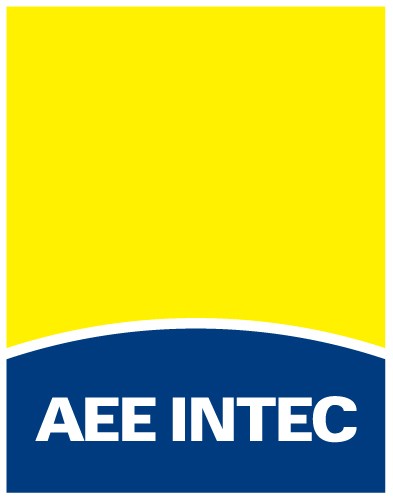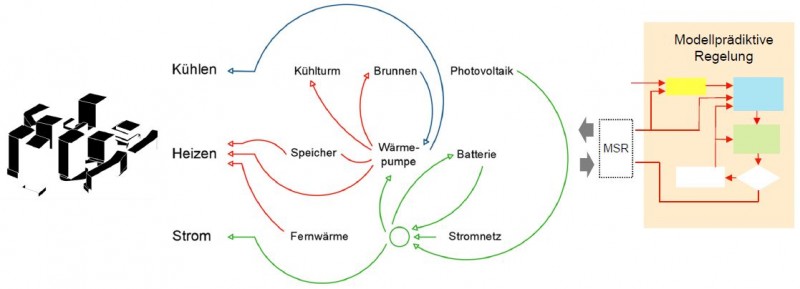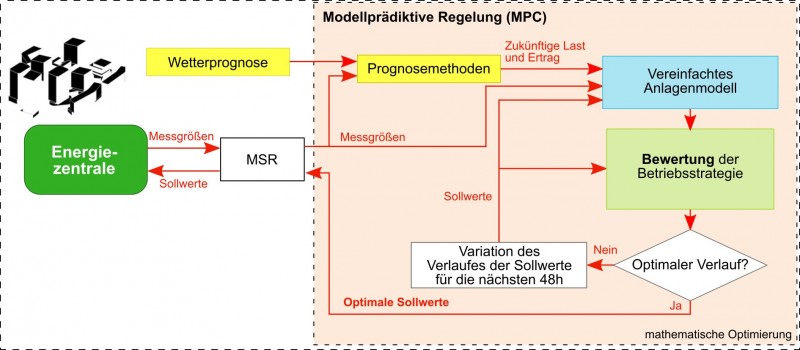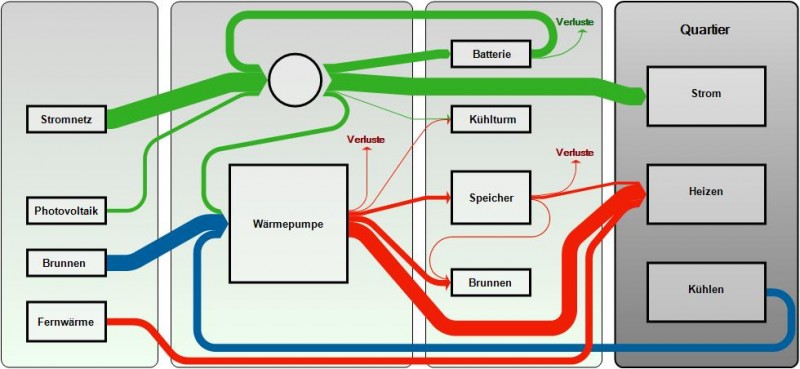ÖKO-OPT-QUART: Economically optimized control and operating behavior of complex energy networks of future city districts
Starting point/motivation
In future city districts, the focus on a reasonable combination of different, where possible renewable energy sources is increasing. However, the resulting energy networks are getting more and more complex. This increase of complexity has its origin mainly due to the dependency of renewable energy production on non-controllable, varying environmental conditions (e.g. wind or sunlight), the increasing decentralization and the growing demand for efficiency. However, currently applied control methods are not yet capable of operating such complex systems reliably and efficiently. In order to develop suitable control strategies which would ensure a robust and efficient operating behavior, non-steady simulation models in high resolution (time and space) are required. Such models are currently only available to a limited extent due to the high complexity of the system. Furthermore, there is neither a practical, systematic approach nor are there any guidelines how to deal with a new project and its requirements in order to develop and implement a high-level control.
Contents and objectives
In the project ÖKO-OPT-QUART predictive, high-level control strategies were developed based on an energy-based and economic simulation model. These strategies were simulated for a concrete example configuration (a city district currently being planned). This approach allows for clearly identifying and reliably evaluating the investment-, installation- and operating mode strategy with the greatest economic benefit. In addition to the methodical findings, a secondary benefit was generated. The evaluation of the developments based on real boundary conditions, made it possible to directly integrate the acquired knowledge into the real development of the city district being planned.
Methods
In the project different models (energy-based, economic and control-oriented) for complex energy networks in city districts were developed and combined to an overall model for an exemplary configuration. The energy-based modelling describes both the thermal as well as the electro-technical behaviour of an urban energy network in a detailed way with a high resolution in time. The economic modelling allows a continuous economical evaluation of the operating mode, by providing the possibility to track and analyse the emerging costs. The control-oriented model either consist of a conventional control strategy or a predictive, cost-optimized control strategy for operating complex energy networks in city districts. This makes it possible to compare the efficiency of both control strategies by comprehensive simulation studies. The development of these models was based on a new city district, which is currently being planned. The integration of the responsible planners and investors in the modelling process ensured a high suitability for daily use of the models.
Results
The aim of the project was the development of detailed and highly resolved, non-steady simulation models. These partial models were then combined to an interdisciplinary overall model, which allowed the simulation of various control strategies for the energy networks of an example configuration. Due to this overall model, it was possible for the first time to realistically quantify the economic benefits of predictive control strategies for the operating mode of energy networks. Furthermore, a methodology for the systematic design of predictive, cost-optimized controls for complex energy networks was developed. This methodology is intended to help in the development of advanced control strategies for a multiplicity of different energy networks of the size of city districts. The simulation studies carried out showed that especially storage technologies are necessary in order to exploit the full potential of the predictive control strategy. The savings potential achieved exceeds the additional costs (increased maintenance and installation costs for the storage technologies) and thus an increase in efficiency (=cost reduction) of the overall system could be achieved.
Prospects/Suggestions for future research
A cost-effective way of storing energy is the use of thermally activated building systems. Therefore, a possible next step could be to extend the model predictive control of the overall energy network developed in this project with the control systems that are effective in the building structure - taking thermally activated building systems into account - and to combine them into a comprehensive overall control concept. This would eliminate the need for additionally installed thermal energy storages and thus further decrease the total costs of the system.
Projektvolumen
EUR 741.679,-
Projektlaufzeit
2017-02-01 - 2019-01-31
Supported by
FFG (3. Ausschreibung Stadt der Zukunft) Stadt der Zukunft ist ein Forschungs- und Technologieprogramm des Bundesministeriums für Verkehr, Innovation und Technologie. Es wird im Auftrag des BMVIT von der Österreichischen Forschungsförderungsgesellschaft gemeinsam mit der Austria Wirtschaftsservice Gesellschaft mbH und der Österreichischen Gesellschaft für Umwelt und Technik ÖGUT abgewickelt. 
Projektpartner







Contact

Daniel MUSCHICK
daniel.muschick@best-research.eu
Area Management

Markus GÖLLES
markus.goelles@best-research.eu


